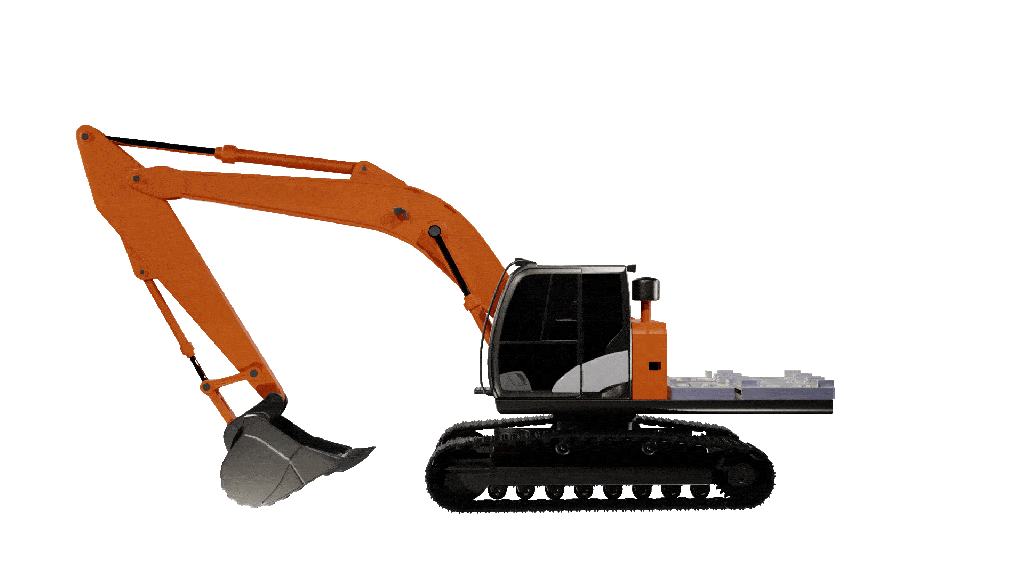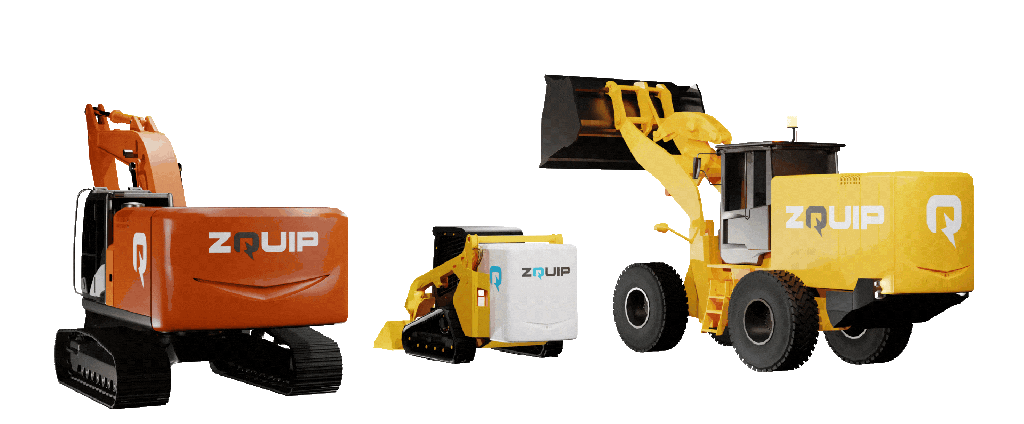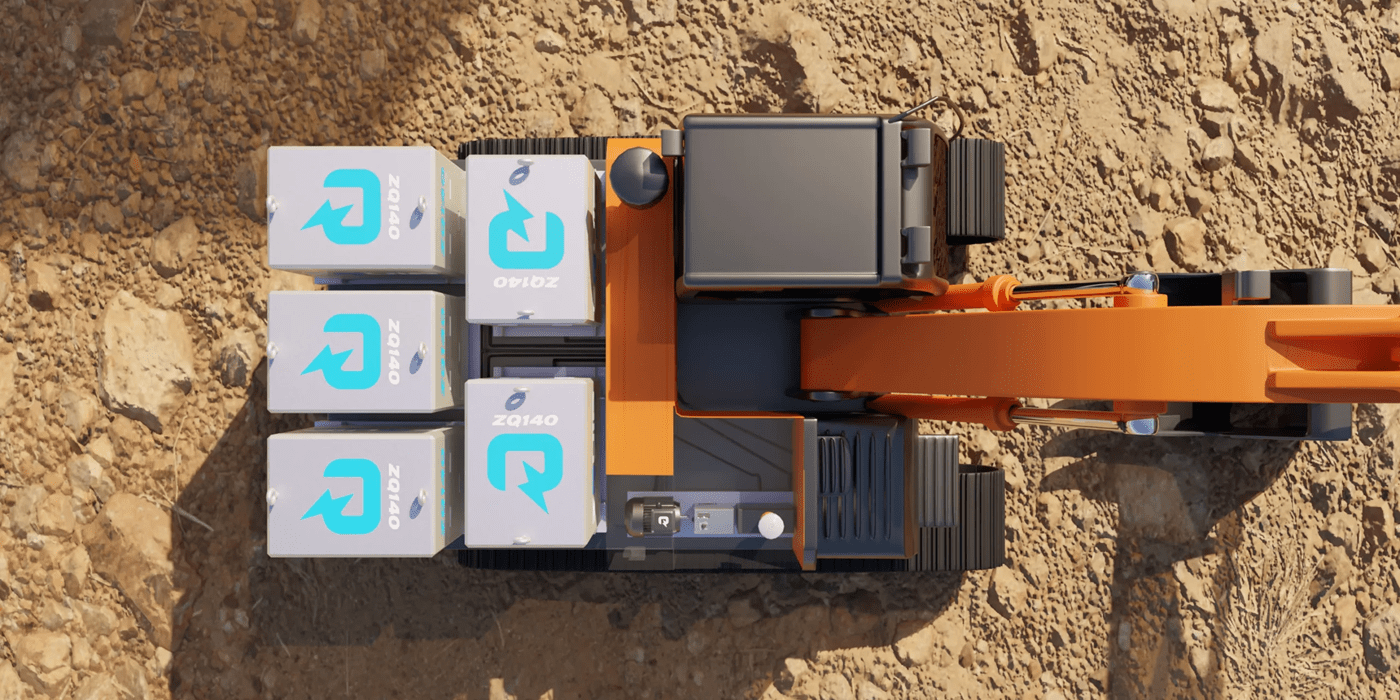Moog modular battery for heavy equipment is too smart to ignore
Th electronic controls experts at Moog Construction have launched the ZQuip Modular Battery System as a lower cost electrification option that enables fleets to convert their diesel-powered heavy equipment into zero-emissions vehicles at a lower cost than buying all-new machines.
First shown as a proof-of-concept model built on a Caterpillar CAT 308 8-ton excavator, the ZQuip battery-electric conversion turned the conventional machine into a quiet, 140 kW, zero-emissions excavator ready to go to work on urban projects with strict noise regulation challenges or on environmentally sensitive zero drip job sites.
“The 700V ZQuip Energy Modules are at the core of this innovation, said Chris LaFleur, managing director for ZQuip at Moog. “ZQuip modules are interchangeable across any machine we convert regardless of size, type, or manufacturer, and will enable a level of serviceability, runtime, and value that is far greater than current battery solutions.”
Moog’s modular approach enables customers to spec zero-emissions machines with the exact battery capacity they need to get their job done, without paying extra for capabilities they won’t use or benefit from.
“Imagine a construction site with six ZQuip machines,” offers Moog’s Kathy Wells. “Two need 800 kWh of battery capacity while four require 400 kWh. The total energy for the day equals 3.2 mWh. In contrast, today’s traditional all-electric vehicles might come equipped with an 800-kWh battery on each of the six machines mentioned above.”
In Wells’ scenario, the fleet owner would effectively be paying for 50% more battery capacity than they need. That’s not only capacity that would go unused, it could be argued that the raw materials spent making those batteries could be put to better use elsewhere.
And if fleet managers get the math wrong? Kathy says that’s fine, too. “(Fleet managers) optimize each machine by installing the appropriate number of ZQuip Energy Modules — and, if necessary, swap them across any machine on the jobsite.”
In practice, that should look like this …

… which, those are huge, 140 kWh batteries, but the idea of just adding batteries where you need capacity is unquestionably a good one. That’s especially true when you consider that these modular batteries can be swapped not just from excavator to excavator, but from excavator to skid steer, to loader, to dozer, etc. as shown, below.

Electrek’s Take
The idea of being able to swap batteries in and out of a family of hand-held power tools is one that’s familiar to anyone whose ever worked on a DIY project, let alone spent time on a construction site. If there’s a material handler on-site or some other mechanism to quickly swap these battery packs in and out of the vehicles that need them throughout the course of the day?
That would be a game changer on a lot of big job sites, and one that would probably meet a warm reception in the market.
FTC: We use income earning auto affiliate links. More.

Th electronic controls experts at Moog Construction have launched the ZQuip Modular Battery System as a lower cost electrification option that enables fleets to convert their diesel-powered heavy equipment into zero-emissions vehicles at a lower cost than buying all-new machines.
First shown as a proof-of-concept model built on a Caterpillar CAT 308 8-ton excavator, the ZQuip battery-electric conversion turned the conventional machine into a quiet, 140 kW, zero-emissions excavator ready to go to work on urban projects with strict noise regulation challenges or on environmentally sensitive zero drip job sites.
“The 700V ZQuip Energy Modules are at the core of this innovation, said Chris LaFleur, managing director for ZQuip at Moog. “ZQuip modules are interchangeable across any machine we convert regardless of size, type, or manufacturer, and will enable a level of serviceability, runtime, and value that is far greater than current battery solutions.”
Moog’s modular approach enables customers to spec zero-emissions machines with the exact battery capacity they need to get their job done, without paying extra for capabilities they won’t use or benefit from.
“Imagine a construction site with six ZQuip machines,” offers Moog’s Kathy Wells. “Two need 800 kWh of battery capacity while four require 400 kWh. The total energy for the day equals 3.2 mWh. In contrast, today’s traditional all-electric vehicles might come equipped with an 800-kWh battery on each of the six machines mentioned above.”
In Wells’ scenario, the fleet owner would effectively be paying for 50% more battery capacity than they need. That’s not only capacity that would go unused, it could be argued that the raw materials spent making those batteries could be put to better use elsewhere.
And if fleet managers get the math wrong? Kathy says that’s fine, too. “(Fleet managers) optimize each machine by installing the appropriate number of ZQuip Energy Modules — and, if necessary, swap them across any machine on the jobsite.”
In practice, that should look like this …

… which, those are huge, 140 kWh batteries, but the idea of just adding batteries where you need capacity is unquestionably a good one. That’s especially true when you consider that these modular batteries can be swapped not just from excavator to excavator, but from excavator to skid steer, to loader, to dozer, etc. as shown, below.

Electrek’s Take
The idea of being able to swap batteries in and out of a family of hand-held power tools is one that’s familiar to anyone whose ever worked on a DIY project, let alone spent time on a construction site. If there’s a material handler on-site or some other mechanism to quickly swap these battery packs in and out of the vehicles that need them throughout the course of the day?
That would be a game changer on a lot of big job sites, and one that would probably meet a warm reception in the market.
FTC: We use income earning auto affiliate links. More.
